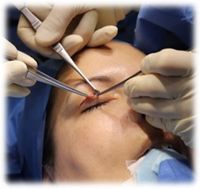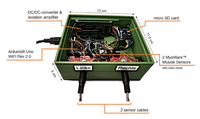Facial rehabilitation
"Smiles are probably the most underrated facial expressions, much more complicated than most people realize. There are dozens of smiles, each differing in appearance and in the message expressed." - Paul Ekman (Psychologist)
Facial expressions are an essential part of our communication. The facial nerve is responsible for controlling the facial muscles and, therefore, for smiling, frowning and closing the eyes. Thus, facial palsy can result not only in medical problems but also a reduced ability to express ourself. Paresis of the facial nerve can be caused by e.g. tumors of the nerve itself (i.e., facial neurinoma), by tumors that press on the nerve (i.e., vestibular schwannoma) or by the consequences of a surgery. The Department of Neurosurgery and Neurotechnology Tuebingen is one of the world's leading centers for the treatment of vestibular schwannomas. Due to the perioperative risk of a (temporary) facial nerve paresis, we are interested in the further development of various methods of facial nerve rehabilitation:
Electromyographic Biofeedback (EMG) of the facial nerve
In electromyographic (EMG) biofeedback patients can get feedback about even minor muscle activity, that does not produce facial movements. This can extend the training in facial paresis and maintain the motivation of patients. However, the validity of previous studies on EMG biofeedback training in facial palsy is limited by small patient cohort because of high acquisition costs and a low availability of EMG devices.
In one of our studies, we were able to develop a custom-made device and prove that the results of such a device are comparable to those of a commercial system:
Currently, CIRAS participates in the BMBF-funded project FaceRehab (https://www.interaktive-technologien.de/projekte/facerehab). This innovative project focuses on developing a home-based facial EMG-biofeedback system to aid in the rehabilitation of individuals with facial palsy. By collaborating with EvoSense GmbH and Docs in Clouds, CIRAS aims to create a user-friendly solution that empowers patients to perform effective facial muscle training at home, enhancing their recovery process and quality of life.

.jpg/picture-200?_=1800a7c3978)
